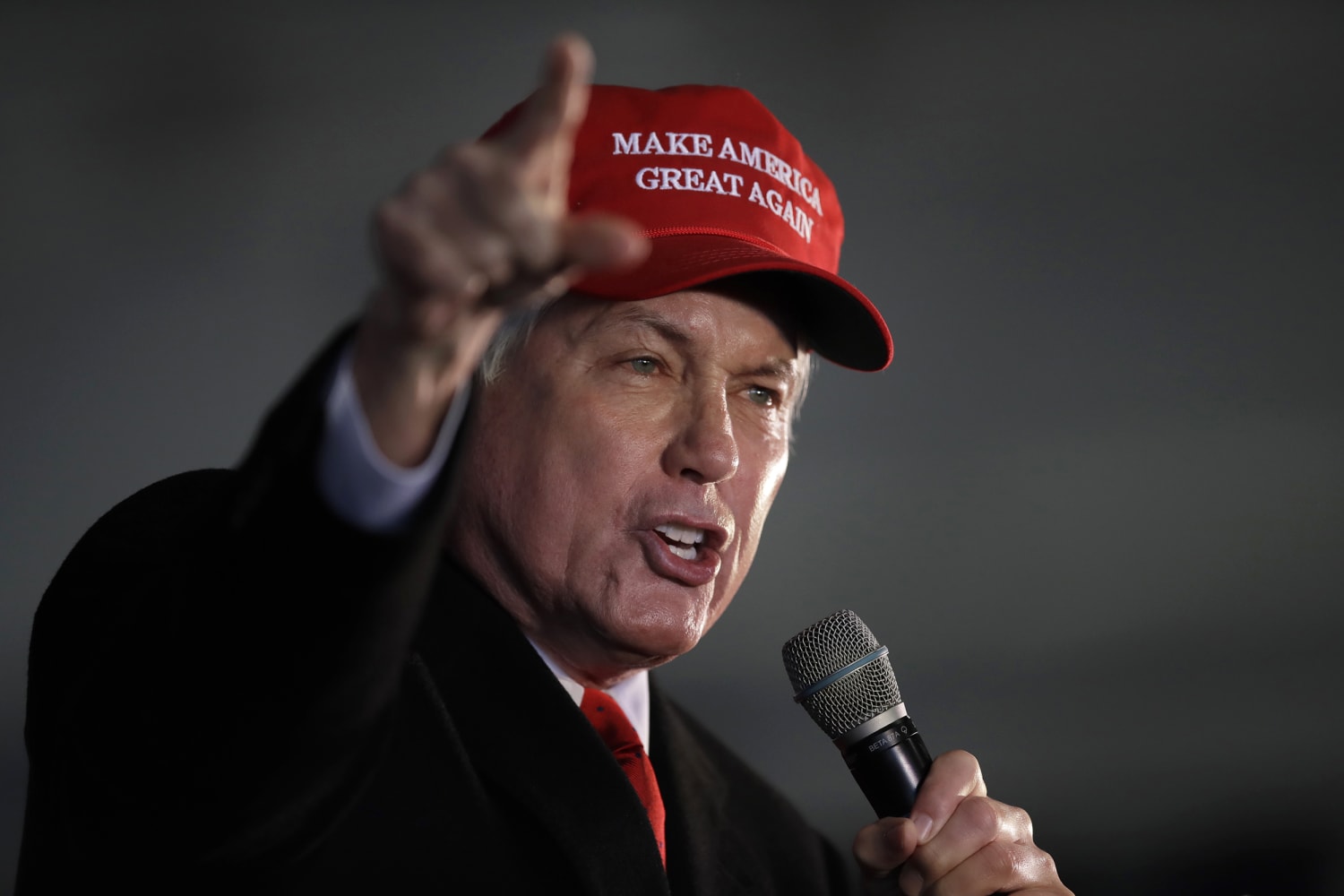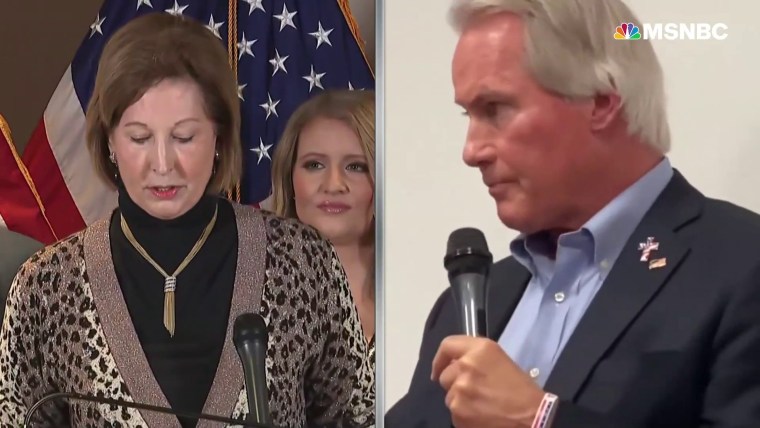The only thing surprising about U.S. District Judge Linda Parker’s order early last month imposing monetary sanctions on nine Trump attorneys was that it was so long in coming. These lawyers — led by conspiracy-theorists-in-chief Sidney Powell and Lin Wood — made outlandish claims of election fraud in Michigan and other key battleground states, all of which were roundly rejected by every court that considered them.
The Kraken suit, and others brought by Trump campaign attorneys, imposed a stress test on the American legal system.
The Michigan suit was part of multistate litigation that Powell called the “Kraken” after the mythic sea monster (the release of which she claimed would destroy President Joe Biden’s victory). The Trump legal team made unsubstantiated claims of computerized ballot stuffing by a deceased foreign dictator and late-night ballot dumps by mysterious trucks, leading Parker to lambaste the lawsuit as “a historic and profound abuse of the judicial process.”
The Kraken suit, and others brought by Trump campaign attorneys, imposed a stress test on the American legal system by seeking to co-opt courts to advance a fabricated account of the election results. Parker’s order suggests that the American system passed this test — just barely, and just for now. To protect against this type of attack in the future requires a concerted effort by the entire legal profession. It is therefore crucial that the lawyers on the bench and in the bar take seriously what they can do — and must do — better.
Parker’s order offers judges a master class in how to mobilize the significant tools at their disposal to protect against efforts to convert courtrooms into platforms for partisan, conspiratorial spectacles. These wide-ranging tools are derived from statutes, court rules and the inherent powers of judges to enforce standards of conduct in their courtrooms. This mean enforcing rules against vexatious litigation, frivolous claims and the failure to conduct independent analysis and fact-checking required by officers of the court.
Perhaps most significant is Parker’s forceful ruling on lawyers’ obligation to the truth. Of course, it isn’t possible for lawyers to verify every detail of claims made in time-sensitive litigation. However, they have an absolute duty to reasonably inquire into the validity of the facts and laws they assert in their legal briefs.
This is a critical point, because the lawyers in the Michigan suit and others on behalf of then-President Donald Trump sought to protect their patently absurd claims by cloaking them in vague assertions by anonymous experts in unverified affidavits. Parker rejected this legal sleight of hand by showing, for instance, how the lawyers stayed silent after they learned that their key “military intelligence expert” claiming voting machine hacking never completed entry-level training, while their statistical “expert” analysis of voter turnouts (falsely claiming a reported 460 percent turnout in Zeeland Charter Township) didn’t use official precinct numbers.
Parker’s order also makes it clear that lawyers don’t have a First Amendment right to say whatever they want in court in the service of a political objective. To the contrary; the privilege of being a lawyer comes with a duty of candor and honesty. While the First Amendment protects public statements and even lies (which politicians make all the time) out of court, lawyers don’t have the right to make wholly unsubstantiated claims — as mythical as the Kraken itself — like this fanciful fable: “at some time after the 2016 election, software was installed that programmed tabulating machines ‘to shift a percentage of the absentee ballot votes from Trump to Biden.’”
While Parker’s decision is a tour de force of rigorous fact-based analysis and a much-needed rejoinder to the loopy unreality of the Kraken universe, it also reveals the limits of the system.
Yet while Parker’s decision is a tour de force of rigorous fact-based analysis and a much-needed rejoinder to the loopy unreality of the Kraken universe, it also reveals the limits of the system. It is notable that Parker dealt only with the lawyers’ egregious misconduct on motion by the defendants, which is part of the reason the sanctions were so long in coming — and that they came only after so much damage was done. In the future, courts should be more proactive in policing rogue lawyers, not wait for others to complain before they take steps to stop conduct inconsistent with the rule of law.
In addition, Parker’s order primarily looks backward — making the Trump attorneys pay for defendants’ legal fees (Parker also ordered the lawyers to undergo continuing legal education, a tool that should be used more often). While the opinion aims to “deter future misconduct” by hitting lawyers in the pocketbook, the lawyers in this case aren’t likely to be deterred by fines, given that they may be bankrolled by clients with near-limitless access to funds who will do whatever it takes to advance their political agendas.
This means that it is now up to the state bars with authority over these lawyers — Texas for Powell, Georgia for Wood — to ensure that they don’t have the ability to do this again. Rudy Giuliani, Powell’s “elite strike force” colleague, has already had his license suspended in New York. Based on Parker’s order, there are at least four grounds for such discipline against the Michigan lawyers.
First, lawyers are required to act with basic competence. This doesn’t mean they have to turn over every stone before filing a case, but it does require adequate preparation and a basic knowledge of law. This sounds obvious, but in the Michigan suit, the lawyers asserted various legal violations based on facts that, even if they were true, didn’t violate any law. For instance, they alleged that officials violated Michigan election law by counting ballots that lacked postmarks — but in Michigan, ballots can be hand-delivered and thus don’t need postmarks.
Second, lawyers aren’t permitted to assist clients in conduct they know is fraudulent. As Parker made clear, the Trump campaign’s claims of “election fraud” were themselves part of a massive fraud on the American public. The lawsuits were a cornerstone of this scheme, laying the foundation for a misinformation campaign funneled through social media. Remarkably, Powell doesn’t even pretend to stand by her wild accusations. To the contrary, in defending herself against a defamation suit brought by the voting machine company Dominion, she states that “reasonable people would not accept” the allegations in the Kraken suit as true, effectively conceding her own ethical misconduct.
Third, lawyers are prohibited from filing meritless claims. Here, the Trump lawyers essentially admitted that the suit was bogus by conceding that they were seeking a remedy — preventing the certification of Michigan’s electors — after that certification had already occurred. Moreover, lawyers may not “knowingly” make “a false statement of fact or law to a tribunal.” That knowledge may be inferred when lawyers bury their heads in the sand by relying on unverified affidavits or speculative statements that are contravened by all known objective evidence.
Finally, it is professional misconduct for lawyers to do anything prejudicial to the administration of justice. As Parker’s order lays out in stunning detail, the Michigan suit was brought with the purpose of “deceiving a federal court and the American people into believing that rights were infringed without regard to whether any laws or rights were in fact violated.” This is misconduct on an epic scale. Although Powell and her Kraken colleagues didn’t storm the Capitol, they did something arguably as consequential. Casting doubt on the integrity of American democracy to try to steal an election is the closest thing to a coup that the American system has seen. If the state bars with regulatory authority over these lawyers don’t act to punish this historic abuse, they will invite future attacks. And next time, it isn’t certain the system will hold.
Source: | This article originally belongs to Nbcnews.com











